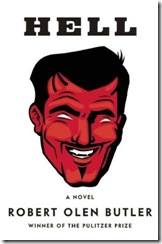 The temptation to construct a review of Robert Olen Butler’s novel Hell entirely from quotations and excerpts is almost more than I can resist. And really, why should I resist? In Butler’s propulsively clever yet unsettling vision of the afterlife, I would be unable to avoid eternal damnation no matter what I chose: virtue or vice, piety or sacrilege, ethical rectitude or professional whoredom.
The temptation to construct a review of Robert Olen Butler’s novel Hell entirely from quotations and excerpts is almost more than I can resist. And really, why should I resist? In Butler’s propulsively clever yet unsettling vision of the afterlife, I would be unable to avoid eternal damnation no matter what I chose: virtue or vice, piety or sacrilege, ethical rectitude or professional whoredom.
Oh, where to begin? With our hero, Hatcher McCord, a TV anchorman in love with the sometimes headless Anne Boleyn? Satan’s minion J. Edgar Hoover in a powder-blue jumpsuit with Robin and Maurice Gibb as his singing, dancing henchmen? William Randolph Hearst as a blogger (“keeping up with advances in technology is one of the great tortures of Hell for the old-timers”)?
Herman Melville, trying to write a novel but unable to get past the first sentence (“Call me E-mail”)? An Automat frequented by Minor Prophets whose writings didn’t quite make it into the Bible? George W. Bush, so dumb and deluded he thinks he’s in Heaven? Or Satan himself, all smarmy cunning, smelling of Old Spice and complaining of father issues: “It’s all about family values,” he tells Hatcher.
Clearly, this is a Hell where people suffer for our amusement. And yet, Butler’s ability to maintain this juiced-up, darkly comic riffing throughout the entire novel is the least of his achievements. Becoming too dazzled by the manic satire risks missing the humanity beneath the surface. Not to mention the existential horror.
In life, McCord was no worse than the common run of humanity. A bit of talent and luck brought him wealth and fame as a newscaster of the Peter Jennings-Dan Rather ilk, which he used mostly to satisfying his own desires, leaving embittered wives and collateral-damage children in his wake. But did he really deserve to go to Hell?
The question plagues not only McCord, but everyone he meets in Hell, which includes not only great villains (Hitler, Stalin, Leni Riefenstahl, now Satan’s personal photographer), but also ordinary people, inoffensive celebrities (Humphrey Bogart, Sylvia Beach, Ray Kroc), and even men of God – Billy Graham exhorts Satan to stage an altar call.
Hell’s plot follows McCord as he seeks a rumored back door out. Dante may know the way, or perhaps Virgil. Judas is certain a second Harrowing is about a take place, with Jesus descending to pluck a few lucky and deserving souls to Paradise. McCord desires escape not only for his own sake but also for his beloved Anne.
Butler wisely makes his Hell more than a cardboard backdrop before which  he can lark a succession of modernist parodies. Hell is a specific, thoroughly imagined place, a sort of Atlanta, if Atlanta were designed by Hieronymus Bosch, where all the streets are named “Peachtree.” Pleasure is impossible – Hatcher and Boleyn never succeed in consummating the act of love. Flaming sulfur rains from the sky every afternoon, melting thousands to goo. The damned are dismembered daily, only to have their fleshly bodies reconstituted so they may endure fresh agonies. This sense of endless, inescapable torture is never far from the reader’s mind, even at moments of antic hilarity.
he can lark a succession of modernist parodies. Hell is a specific, thoroughly imagined place, a sort of Atlanta, if Atlanta were designed by Hieronymus Bosch, where all the streets are named “Peachtree.” Pleasure is impossible – Hatcher and Boleyn never succeed in consummating the act of love. Flaming sulfur rains from the sky every afternoon, melting thousands to goo. The damned are dismembered daily, only to have their fleshly bodies reconstituted so they may endure fresh agonies. This sense of endless, inescapable torture is never far from the reader’s mind, even at moments of antic hilarity.
McCord’s interview with Satan comes not at the climax of the story, where a less assured novelist might put it, pregnant with meaningful revelations, but in the middle. The one useful thing McCord learns is that contrary to common belief, Satan cannot read his thoughts. This allows Butler to regain free will, even if he cannot always act on it. He begins looking up former wives (all in Hell, too) in an attempt to make amends.
Does McCord redeem himself from past crimes, however piddling, and make it to Paradise? It would be a sin to tell – but if Sartre was right, and Hell is other people, then what is Heaven? Of course, trite though it may be to say, Butler’s subject here is not suffering among the dead in Hell, but among the living on earth. Seldom has literary fantasy turned the trick so well.
Really, it’s no more than Butler has led us to expect. Like few others, he is a gifted literary egghead who takes trash culture seriously.
After winning the Pulitzer Prize in 1993 for A Good Scent From a Strange Mountain, a collection of short stories about Vietnamese refugees in Louisiana, he produced fiction based on supermarket rags (Tabloid Dreams), alien abduction (Mr. Spaceman), vintage postcards (Wish You Were Here), beheading (Severance), and human copulation (Intercourse). In Butler’s later work, high culture and low marry happily, ennobling the one and re-energizing the other.
In Hell, though, Butler has cast aside the last crutch of self-conscious “fine” writing, which occasionally encumbered otherwise admirable books such as Mr. Spaceman. That’s a noteworthy breakthrough, and it gives Hell a feeling of culmination, as though Butler has reached the end of something. I look forward to what he might think of next — albeit with no little fear and trembling.
Chauncey Mabe, the former books editor of the Sun-Sentinel, can be reached at cmabe55@yahoo.com. Visit him on Facebook.
HELL. By Robert Olen Butler; 240 pp.; Grove Press; $24.